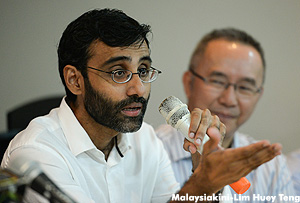Laws should not be used by the government to stifle the public's constitutionally guaranteed right to dissent, says Padang Serai parliamentarian N Surendran.
"It is no business of the laws in a democratic country to protect the reputation of the government or its leaders from 'slander' or criticism. Vigorous criticism of government is the lifeblood of democracy.
"Any government leader who feels aggrieved by 'slanderous' statements can always sue for defamation in the civil courts. But there must be no resort to the criminal laws to protect their reputation or the government's reputation," he said in a statement today.
 Surendran (
photo, left
) was responding to the proposed amendments to the Communications and Multimedia Act 1998 which Deputy Minister of Communications and Multimedia Jailani Johari said on Thursday will be tabled in the Dewan Rakyat in the March session.
Surendran (
photo, left
) was responding to the proposed amendments to the Communications and Multimedia Act 1998 which Deputy Minister of Communications and Multimedia Jailani Johari said on Thursday will be tabled in the Dewan Rakyat in the March session.
Prior to that, the Minister Salleh Said Keruak had said that the amendments to the Act will crack down on those who 'spread slanderous statements on the government'. News portals, websites, and social media will all be subject to these new amendments.
The proposed amendments, Surendran posited, is tantamount to the BN-led ruling party misusing its majority in parliament to criminalise criticisms against the government, whether they are well-founded or not, labeling it unconstitutional and unacceptable in a democratic system.
Surendran said in many Commonwealth democracies, including the UK, the government has no right to even sue individuals in a civil court for defamation, let alone enact laws to stop the people from criticising the government.
"The rationale is that the people have the right to criticise the government which is paid for by the tax-payers, even though the criticism is false or defamatory. Here, in Malaysia, criticism of the government is being criminalised," he argued.
People judge true or false
Surendran said that government leaders complained 'false or defamatory' information being posted on social media or cyberspace, and used this as an excuse to tighten up criminal laws, which more often than not are used to target critics.
"Yet, it is no business of a democratic government to ensure 'truth' in the social media or cyberspace. In a democracy like ours, the people must be allowed to judge what is true or false. No resort must be made by government to the criminal law in order to control what is being said on social media or cyberspace," he said.
The lawyer pointed out that any government which stifles criticism fears the truth, and fears its own citizens.
"The BN and its ministers must respect the federal constitution which guarantees the right to freedom of speech. While that freedom is not absolute, restrictions to the right of free speech cannot be disproportionate or render the right illusory or non-existent.
"Cracking down on alleged 'slander of the government' in cyberspace or news portals and websites as proposed by these ministers will certainly nullify freedom of speech in this country and seriously undermine democracy," he warned.
In recent years, the BN-led government has continued to enact new restrictive laws and strengthen security laws already in place, citing fears of terrorism.
Though in most case, the laws are mainly used to crack down on critics and dissidents, with the screws being tightened with proposed amendments to laws like the Communications and Multimedia Act.
Attorney-general Apandi Ali had also called for amendments to the Official Secrets Act, to provide for stiffer punishments for those leaking state secrets and journalists who report them, lamenting the recent rash of leaks on alleged government abuse and corruption.
'MCA supports regressive laws'
Meanwhile Perak DAP publicity bureau chief and political secretary to Taiping MP Chong Zhemin asked MCA president Liow Tiong Lai to state his party's stand on the AG's proposals.
Liow yesterday expressed " concern " over the proposal and said it is regressive.
However, said Chong, MCA has had a long history of supporting BN's repressive laws including the Peaceful Assembly Act, Security Offences Special Measures Act (Sosma), and the retention of the Sedition Act.
"Liow's reply is a typical MCA leader's respond to pay lip service and a tokenistic PR (public relations) exercise.
"MCA has a bad track record when it comes to defending the people and national interest during the tabling of draconian laws in the lower and upper house.
"MCA's track record is solid proof that the party has no qualms supporting regressive, oppressive and draconian laws in the past and will continue to do so in the future, as long as Umno gave the nod.
"There is not a single doubt that if the proposed amendment of OSA is tabled in parliament, all MCA MPs will solidly support the amendment," he said.
Chong challenged Liow to come up with a straightforward answer on the amendments.
"Will MCA support the proposed amendment of OSA to punish whistleblowers and journalists with life imprisonment? Yes or no?" he asked.

